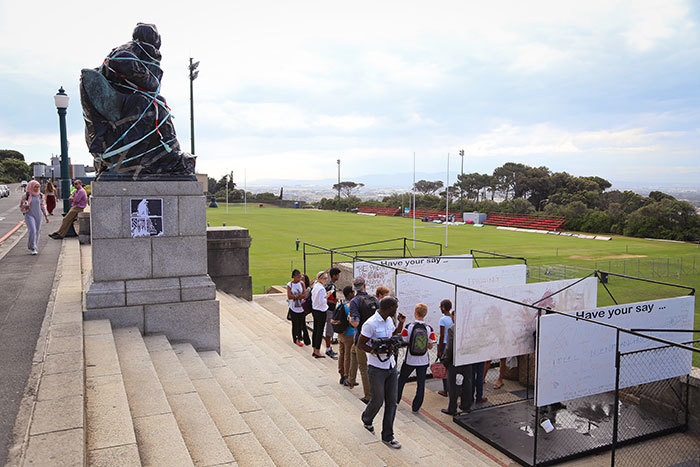'History changes over time – nobody owns it'
31 March 2015 | Story Newsroom. Photo Je'nine May
We need to come to terms with our history, to understand the contribution of those who made their mark on society – often in a complex and contradictory way, writes Ghaleb Cachalia in a letter to UCT's Vice-Chancellor Dr Max Price on 25 March 2015:
I've been following, for a while now, the events at UCT surrounding the Rhodes legacy and statue and have the following comments.
UCT was formally established as a university in 1918 on the basis of the Alfred Beit bequest and additional gifts from mining moguls, Julius Wernher and Otto Beit. In 1928 the university was able to move to the site at Groote Schuur on the slopes of Devils Peak on the land bequeathed by Cecil Rhodes as a site for a national university.
Rhodes, Wernher and Beit were complex, avaricious, accumulative individuals who amassed great fortunes. They were men of their time and were shits, benefactors and swashbucklers. They all contributed in great measure to the industrial and financial foundation of this country and UCT aside they benefacted the Johannesburg Art gallery, Imperial College, Health Projects, and numerous other educational projects and scholarships which still run today.
Like many of their ilk their contributions and achievements were recognized; edifices, streets, towns and the like were named after them and statues built to honour them.
This is part of the complex history of our country. It harks back to the time of empire when men like these made their mark – good and bad on the pages of our common history.
Throughout history statues and accolades have been erected and given to all sorts of villains and visionaries from Gengis Khan through Shaka and the Pharoahs – to name but three characters, which in the annals of worldwide history have formed part of this time-honoured tradition. In England today, a statue of Gandhi has been erected to stand alongside his arch detractor, one Winston Churchill, in Parliament square.
I dare say the Emperor Bokassa's statue still stand in the Central African Republic as a monument in part to his canabalism! They might also ruminate on the course of events in that country post Bokassa when Michel Djotodia took over as president and in May 2013 Central African Republic's Prime Minister Nicolas Tiangaye requested a UN peacekeeping force from the UN Security Council and on 31 May former President Bozizé himself was indicted for crimes against humanity and incitement of genocide. History is not static and erstwhile rulers come and go – their contributions, good and bad, forming part of that very history.
These characters and their role in history have been the subject of much scholarly interrogation and the implications need to be constantly reassessed as time goes by.
Interrogate, inform, critique, by all means. To trash them though would be akin to the activities of ISIS in Syria and dare I say, to the burning of books by the Nazis, Isis, Boko Haraam and others.
We need to come to terms with our history, to understand the contribution of those who made their mark on society – often in a complex and contradictory way. To call for their destruction represents a failing. To smear them with faeces is crass, stupid, unsanitary and frankly, criminal. What is required is scholarly and artistic engagement that posits a contrarian view of the past.
That said, the call by many students at UCT to bring down Rhodes?s statue and the ensuing protests which resulted in the smearing of the statue with faeces and its subsequent covering up are now exercising the authorities at UCT and those in broader society – and so it should. Debate has to be widened and heritage protected.
Perhaps these detractors of history would choose instead to benefact institutes of learning to the tune that Rhodes and others did? Perhaps the will eschew sholarships from the Rhodes Mandela trust? Perhaps they will resign from Rhodes University?
They would do well to remember that Rhodes and his followers were architects of the Jameson Raid and were ardent supporters of the British Empire that starved thousands of Afrikaner women and children in concentration camps. They may wish to note that when Afrikanerdom triumphed in 1948 and withdrew from the commonwealth in 1960, the Nats and ordinary Afrikaners who held no candle for the likes of Rhodes and their ilk didn't change names or bring down statues. They built their own and named their own. Even the Nats, by refraining from such action, showed some respect for the complexity and contribution of Anglo history. They engaged it and took it on – much like the ANC did to the Nats.
These students who are pushing for a more draconian reaction would do better to engage in the realm of ideas and contribute to the contextualization of these offending edifices within the framework of current history. And they would do well to remember that history changes over time and that they – nobody – owns it.
Letter written by Ghaleb Cachalia to UCT's Vice-Chancellor Dr Max Price on 25 March 2015.
 This work is licensed under a Creative Commons Attribution-NoDerivatives 4.0 International License.
This work is licensed under a Creative Commons Attribution-NoDerivatives 4.0 International License.
Please view the republishing articles page for more information.










